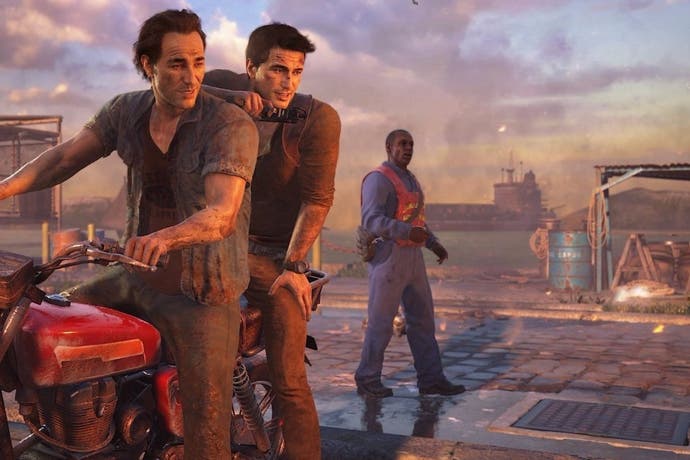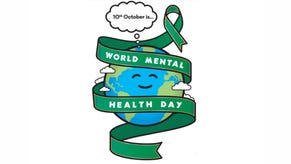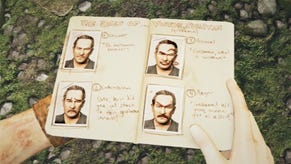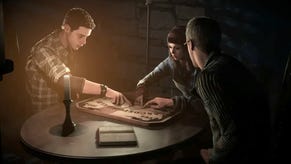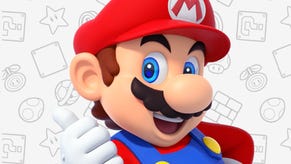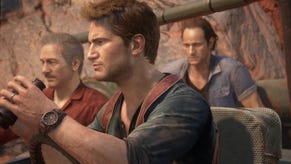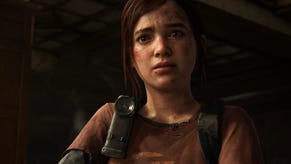Naughty Dog's Neil Druckmann on why Uncharted has to end
"With the end of this story it will be really hard to do a sequel."
Neil Druckmann is different to most AAA video game developers.
His actorly approach to performance capture, storytelling and a sideline as a graphic novel writer already mark out Naughty Dog's Israeli-born director as something of a renaissance man, and when I sit down with Druckmann at Sony's pre-Xmas PlayStation Experience event in San Francisco, it's in markedly different circumstances to the typical interview with a developer of his stature. There's no sterile meeting room, and no PR team watching the clock and nervously listening to every word lest an errant soundbite somehow escapes into the conversation like an unsupervised zoo animal making a desperate bid for freedom
Sure, there's a Sony representative present, but he'd be hard pushed to hear anything above the rattle and hum of the very public corner of the main showfloor we're sitting in. The PR is perched in one of the chairs we'd brought over for the interview but Neil and I are cross-legged on the floor - at the Naughty Dog man's specific request.
Maybe it's down to the laid-back, fan friendly vibe of the show; perhaps it's because today is Neil's 37th birthday and he's refusing to enter business mode; or it could, of course, be an affectation aimed at amplifying an air of artistry.
But judging from the way he casually and candidly discusses everything from having to play the corporate PR game - "Look, if it was up to me, we would show nothing" - to the series' future - "with the end of this story it will be really hard to do a sequel with Nathan Drake" - it could just be the way he is. Different.
Fittingly, then, let's start at the end. As you might have read, Uncharted 4's 'A Thief's End' suffix isn't just for show: the game is a full stop on both Naughty Dog's involvement with the franchise and also the adventures of its charismatic hero Nathan Drake.
"We've been with this character for so long...," explains Druckmann with what sounds suspiciously like a heavy heart. "He's at the height of his popularity, so it's not a good business decision, but I feel like the best way to honour him is to go out on top, to finish his story.
"Whether that's it for Uncharted? I don't know. At the end of the day Sony owns Uncharted and they can do whatever they want. But with the end of this story it will be really hard to do a sequel with Nathan Drake. Maybe there'll be a prequel, maybe it will be a different character - I don't know. But this is the end for Nathan Drake."
Whether that means death or a fate worse than it, Neil understandably isn't saying. But it's merely the headline-grabbing denouement to a lengthy discourse peppered with more nuanced but equally intriguing revelations about how he's reshaping the series in his own image. Having worked as a game designer and co-writer on the first two Uncharted instalments, Druckmann ducked the third to direct his first game, The Last of Us. He says he missed the franchise but enjoyed an "awesome" experience playing Drake's Deception as a fan. "I never get to enjoy our games," he explains. "I can't play the Last of Us, I can only hear people describing their experiences playing it. If I play it, I just get frustrated at all the things I want to fix."
Switching gears from Drake and Sully's bombastic bromance to the intimate surrogate father/daughter relationship of Joel and Ellie, and then back again, was not without its challenges. "Bruce Straley - my directing partner - and I talk about his a lot. Going from Uncharted to The Last of Us, it was hard to tell people to bring it down. And then when we came off The Last of Us, we were like, 'Guys - we need to crank it back up to 11'! Directing the team, it was kind of hard to make that shift."
What is it that Druckmann brought from The Last of Us to Uncharted 4, exactly? "The Last of Us was the first game I directed, where I was in charge of the outcome of the game, so obviously there was a lot of experience I got there that now is coming straight to Uncharted," he admits. "Like, how do you work with actors? How do you work with animators? How do you work with designers? Now I feel like I'm getting more and more confident making those calls whereas before I was not as confident, but I was surrounded by very supportive people.
"And then there is stuff like, with the Last of Us - and even more so with [2014's DLC add-on] Left Behind - the really quiet moments. We were making an action game, but it was okay not to have the action wall-to-wall. It was okay to have two girls in a Halloween store putting masks on and joking around with each other.
"And getting the confidence to do that and bring that to Uncharted became really interesting because it helps show more the human side of Nathan Drake. What is Nathan Drake doing when he's not on the adventure? And how do you put that on the thumbstick. How do you not just show that in a cut-scene - how do you play that? That's something we brought straight over from the Last of Us.
"It's not a specific example, but with the Last of Us we introduced the concept of optional conversations where I could turn around to my ally and dig in a little bit deeper. And it's a choice for the player, you can do it, or you don't do it.
"Players who engage with it can slow the characters down a little bit and have them engage in conversation, and you can find out a little bit more about their relationship, and a little bit more about their personalities. We've sprinkled those throughout the game."
Earlier that day, during Sony's keynote presentation, Naughty Dog had debuted an interactive cut-scene from Uncharted 4 in which Nate was reintroduced to his estranged sibling Sam, voiced by the near-ubiquitous Troy Baker, for the first time.
Nate begins effusively filling in his brother about the adventures he's undertaken since the pair last met and partway through the exchange pauses to allow the player to decide which of three tales should be told first (each option is a précis of a previous Uncharted game's main plot - a typically neat touch). It's a small but nonetheless significant departure for what has always been a determinedly linear series.
"The thing I want to make sure we're clear about is that we're not making Mass Effect," Druckmann elaborates with a wry smile. "Uncharted has a very specific story, it has a very specific ending that's very definitive to the franchise. But every once in a while we felt a dialogue tree would really bring you more into the scene.
"And there's something about Sam asking Nate about his old adventures that's like, it would be kind of fun to have Nate - and therefore the player - pick which story they want to tell first. And there's a few other instances like that where it felt like a dialogue tree was just going to get you more into the scene and make it more interactive."
The prospect of some of the storytelling techniques pioneered in The Last of Us finding their way into Uncharted 4 is fascinating. The series is rightly renowned for its characterisation - Drake and sidekick 'Sully' are as charming company as any Hollywood buddy movie duos - but has increasingly come to substitute spectacle for substance.
Revisiting the original games in their recent remastered form, it's striking to chart how the emphasis shifted from scripted dialogue to scripted action. The third instalment is practically a string of increasingly explosive set-pieces connected by cut-scenes. "The first three had this trajectory of going bigger and more badass," Druckmann agrees. "We didn't want to continue that trajectory. We didn't want to become a caricature of ourselves. So we said, okay set pieces are important, but how do you better tie set pieces with story so they come in at the right time to mirror some kind of personal conflict in the story?
"But also something we learned from The Last of Us is not all set pieces have to be big and explosive. Some of them can be small and intimate. And that lets us get much more interesting and introduce different pacing than in the previous Uncharted games. So that's the thing we're experimenting with, trying to find a different way to switch up that formula."
Perhaps there's a comparison to be made to the Bond franchise, which similarly seemed to be caught up in its own internal arms race of 'bigger and more badass' until EON productions switched focus to character development and storytelling with the Casino Royale reboot.
"Yeah, it's like, maybe we should have fewer set pieces, but those set pieces should mean more. Those quiet moments are almost like a set piece. It's all unique animation, there's a lot of iteration that goes into that.
"In Left Behind, there's the photo booth that Ellie and Riley use. That took as much effort and work as the collapsing building in Uncharted 2. And Uncharted 4 felt like it needed some of those moments that require that much effort to build the relationships when we're not under duress and under gunfire."
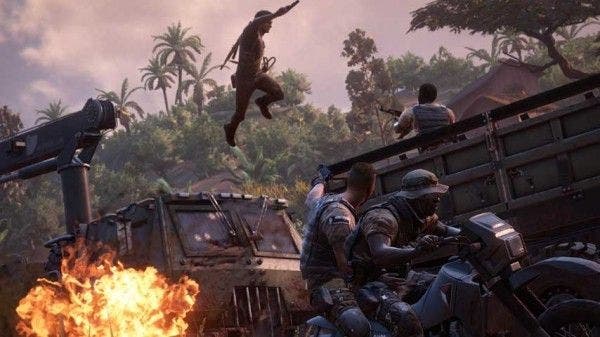
Only a handful of months away from release, we've still yet to see too much of Uncharted 4 - a deliberate coyness from a developer that wants to keeps its surprises a surprise - but what's clear is that it will be a more personal game than what's gone before. Druckmann won't be drawn on specifics, but like most directors, will discuss themes until sundown.
"The heart of this is Nathan Drake's - and maybe an artists' - struggle: how do you balance your relationship with your family and friends, and your passion, the thing you're willing to dedicate your life to and make big sacrifices for?" he explains, warming to his subject.
"If you look at Nathan Drake, he has dealt with obsession his entire life. Whether it's El Dorado in Uncharted or Shangri-La in Uncharted 2 or Iram of the Pillars in Uncharted 3, those have been major obsessions for him and we've seen it hurt his relationship. We've seen how between each game his relationship with Elena falls apart.
"There's something that happens there in that gap that was really interesting for us. That's what we want to get into. Because maybe you can't have both. Maybe you can't have your family and that passion and the obsession.
"When we start this story, Uncharted 4, with the scene we showed [at PSX] today, you see Nathan Drake is living what's for him a very mundane life. Maybe he's not doing what he's meant to do. And it might not take much for his brother just to lure him back in.
"And then every level, every character interaction, it's like, are we always coming back to that? Everything has to get filtered through - is this building on that theme? Are we presenting different arguments of how you handle this kind of conflict in your life?"
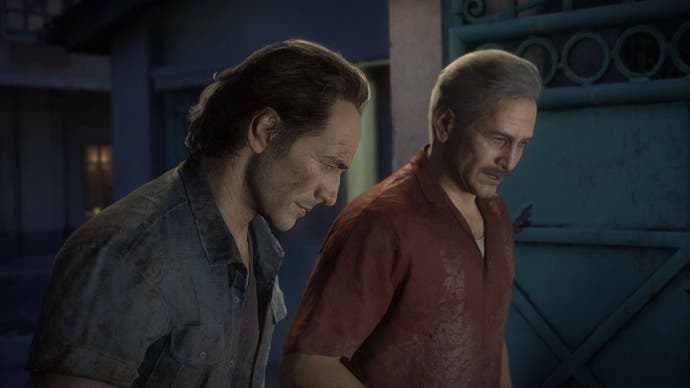
How much of this is autobiographical, I wonder? How much of this might also relate to a developer attempting to balance his family life - Druckmann became a father for the first time during the production of The Last of Us - with his own passion for creating massively involved video games?
"My approach is to always approach things from a very personal level and for me, this was the nugget I could latch onto," he considers, before withdrawing slightly. "I wouldn't go as far as to say it's autobiographical but we are putting a lot of our heart and soul into it because as game developers - and I don't just think it's on a director level, it's on a lot of levels - we've put a lot of ourselves and a big percentage of our life into our passion."
If you're still looking for clues in the parallels between the leading man and his director then know that the latter will be taking a long-delayed vacation and the opportunity to "take a step back, watch some movies, read some books, get inspired by a bunch of things, spend some time with my family, find that balance, and then come in with a fresh set of eyes and be like, okay, what do we want to tackle next?"
Druckmann has made it clear that what to tackle next does not involve Nathan Drake. So what does he have in mind? "Sometimes you play a really good indie game and you go, oh man, it would be really fun to work with something small. But the thing that's exciting when you work at Naughty Dog is you come up with a story, you have something in your mind for it, and then you bring in actors and they surprise you, they make it better than what was on the page, and you're like, that's cool.
"It's literally a miracle how this thing comes together. It's like an army of talent. I'm kind of addicted to that."
